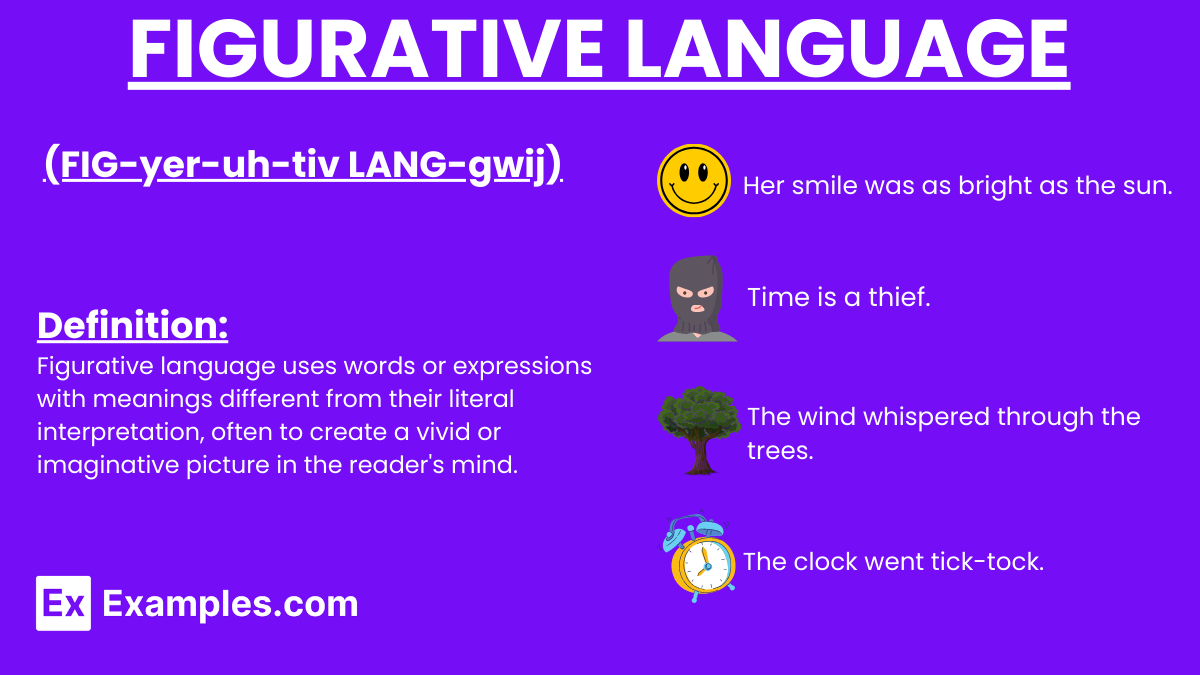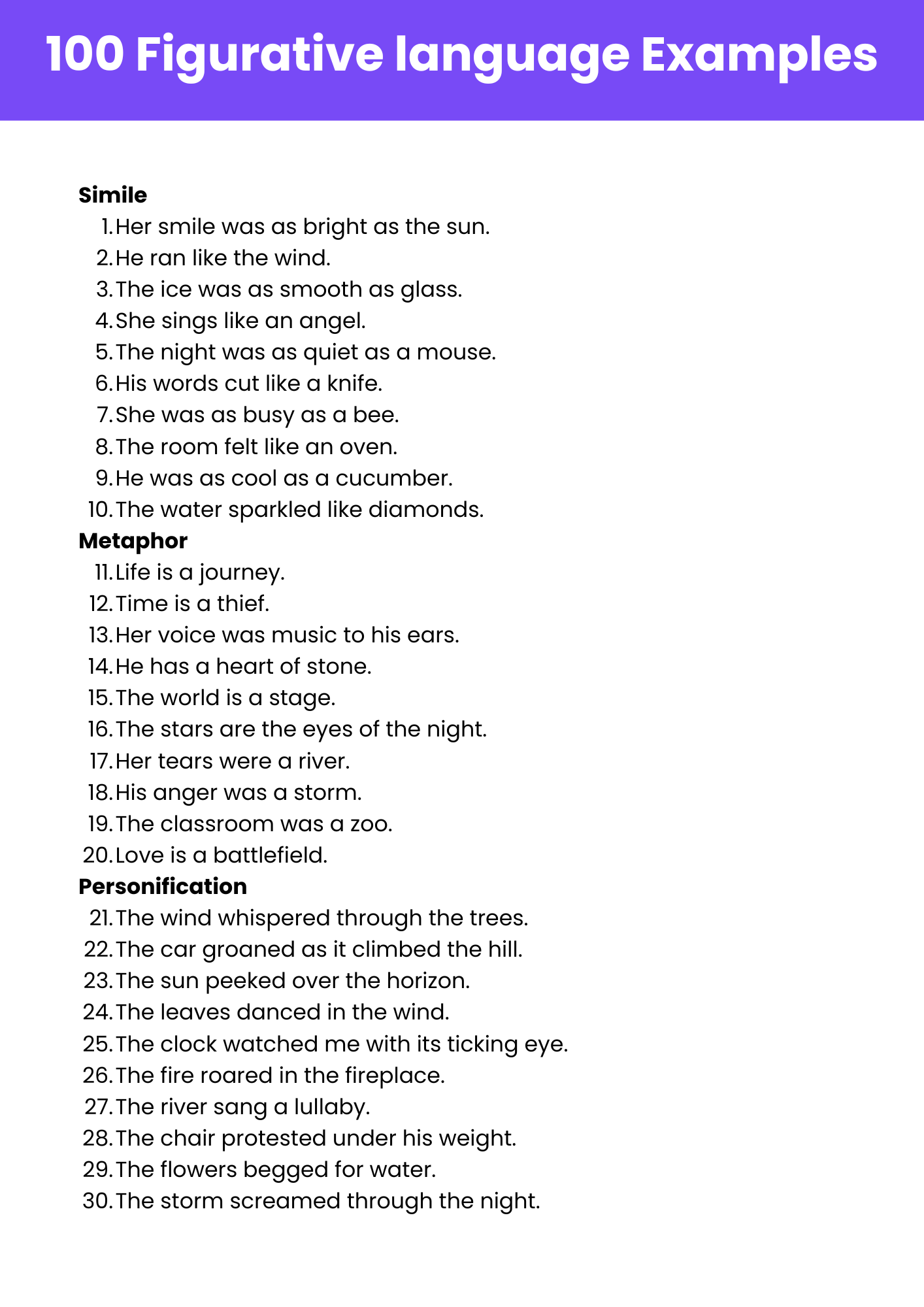Figurative Language
What is Figurative Language? – Definition
Figurative language uses figures of speech to be more effective, persuasive, and impactful. It goes beyond the literal meanings of words to give readers new insights or emphasize particular aspects of a concept.

Generated Figurative Language Examples

Download Figurative Language Examples
Enhance your understanding with our comprehensive PDF guide.
Download PDFExamples of Figurative Language
- Simile: “Her smile was like the sun breaking through the clouds.”
- Metaphor: “Time is a thief that steals our moments.”
- Personification: “The wind whispered through the trees.”
- Alliteration: “She sells seashells by the seashore.”
- Hyperbole: “I’m so hungry I could eat a horse.”
- Oxymoron: “Deafening silence.”
- Onomatopoeia: “The bees buzzed angrily.”
- Imagery: “The golden sunset bathed the landscape in a warm glow.”
- Irony: “A fire station burns down.”
- Symbolism: “A dove symbolizes peace.”
- Allusion: “He was a real Romeo with the ladies.”
- Metonymy: “The White House issued a statement.”
- Synecdoche: “All hands on deck.”
- Paradox: “Less is more.”
- Litotes: “Not bad” to mean “good.”
- Euphemism: “Passed away” instead of “died.”
- Personification: “The night wrapped its arms around the city.”
- Hyperbaton: “This I must see.”
- Anaphora: “We shall fight on the beaches, we shall fight on the landing grounds.”
- Epistrophe: “See no evil, hear no evil, speak no evil.”
- Irony: “A pilot has a fear of heights.”
- Allusion: “He was a real Romeo with the ladies.”
- Metaphor: “The classroom was a zoo.”
- Simile: “He runs like the wind.”
- Alliteration: “Peter Piper picked a peck of pickled peppers.”
- Hyperbole: “I’ve told you a million times.”
- Oxymoron: “Bittersweet memories.”
- Onomatopoeia: “The bees buzzed.”
- Imagery: “The crimson leaves fluttered in the autumn breeze.”
- Irony: “A traffic cop gets a ticket.”
Types of Figurative Language
Simile
A figure of speech comparing two different things using “like” or “as.”
- Her eyes sparkled like stars.
- He was as brave as a lion.
- The clouds floated like cotton balls.
- Her voice was as smooth as silk.
- The night was as black as coal.
Metaphor
A figure of speech that directly refers to one thing by mentioning another for rhetorical effect.
- Time is a thief.
- The world is a stage.
- His heart is a cold iron.
- The classroom was a beehive of activity.
- Love is a battlefield.
Personification
A figure of speech where human qualities are given to animals, objects, or ideas.
- The wind whispered through the trees.
- The sun smiled down on us.
- The flowers danced in the breeze.
- The city never sleeps.
- The stars watched over us.
Irony
A figure of speech where words are used in a way that their intended meaning is different from the actual meaning.
- A fire station burns down.
- The teacher failed the test.
- A plumber’s house has leaking pipes.
- The police station gets robbed.
- A pilot has a fear of heights.
Hyperbole
Exaggerated statements or claims not meant to be taken literally.
- I’m so hungry I could eat a horse.
- This bag weighs a ton.
- I’ve told you a million times.
- He runs faster than the speed of light.
- Her smile was a mile wide.
Symbolism
Using symbols to signify ideas and qualities by giving them symbolic meanings different from their literal sense.
- A dove represents peace.
- The color red often signifies passion or danger.
- An oak tree stands as a testament to strength.
- A broken mirror hanging on the wall brings bad luck.
- The phoenix rising from its ashes symbolizes rebirth.
How to Identify/Find Figurative Language?
To identify figurative language, look for words or phrases that go beyond their literal meanings to convey more complex ideas or emotions. They often involve comparisons, exaggerations, or symbolic meanings.
- Look for comparisons using “like” or “as” indicating similes or metaphors.
- Identify words that give human qualities to non-human entities, known as personification.
- Notice exaggerated statements that aren’t meant to be taken literally, such as hyperbole.
- Detect phrases that use symbolic meanings to represent ideas or concepts.
- Look for contradictory terms used together, like oxymorons, to create emphasis.
How to Use Figurative Language?
Use figurative language to enhance your writing by adding depth, emotion, and creativity. It can help you convey complex ideas more effectively and engage your readers.
- Incorporate similes and metaphors to make comparisons that highlight key aspects of your subject.
- Use personification to bring inanimate objects or abstract ideas to life, making your descriptions more vivid.
- Employ hyperbole to emphasize points and convey strong emotions or opinions.
- Utilize symbolism to represent deeper meanings and themes within your writing.
- Balance the use of figurative language to maintain clarity and avoid overwhelming the reader.
Other Figurative Language Examples
Figurative Language in Daily Life
Everyday conversations and writing are enriched with various forms of figurative language that enhance communication and expression.
- Simile: “He was as brave as a lion.”
- Metaphor: “The world is a stage.”
- Personification: “The sun smiled down on us.”
- Hyperbole: “I’ve told you a million times.”
- Oxymoron: “Bittersweet memories.”
Figurative Language Examples for Kids
Introduce children to the fascinating world of figurative language with relatable and easy-to-understand examples.
- Simile: “As busy as a bee.”
- Metaphor: “The classroom was a zoo.”
- Personification: “The flowers danced in the breeze.”
- Onomatopoeia: “The bees buzzed angrily.”
- Hyperbole: “I’m so hungry I could eat a horse.”
Figurative Language Examples for Students
Enhance students’ understanding of figurative language with examples that deepen their analytical skills.
- Metaphor: “Hope is the thing with feathers.”
- Simile: “Life is like a box of chocolates.”
- Personification: “The city never sleeps.”
- Irony: “A pilot has a fear of heights.”
- Symbolism: “A raven symbolizes mystery.”
Figurative Language Examples for Class 4
Age-appropriate and relatable examples of figurative language for Class 4 students to grasp easily.
- Simile: “As busy as a bee.”
- Metaphor: “The playground was a jungle.”
- Personification: “The sun played hide and seek.”
- Onomatopoeia: “The clock tick-tocked.”
- Hyperbole: “I’m so tired I could sleep for a thousand years.”
Explore Other Literary Devices
Elevate Your AP English Preparation
Unlock your potential with our comprehensive AP English exam preparation tools designed to help you excel.
- Extensive Question Bank: Access 900+ exam-like questions for both AP English Language and Literature.
- Expertly Crafted: Questions mirror the structure and difficulty of actual AP exams, ensuring relevant practice.
- Detailed Explanations: Understand your mistakes with clear, concise breakdowns of correct and incorrect answers.
- Personalized Learning: Tailor your study sessions with topic-specific tests and adaptive learning tools.
- Comprehensive Coverage: Master all aspects of the AP English curriculum with extensive guides and resources.
Frequently Asked Questions
-
What is figurative language?
Figurative language uses figures of speech to convey meanings beyond the literal interpretation of words. It enhances writing by adding depth, emotion, and creativity. -
How does figurative language differ from literal language?
Literal language conveys meanings that are exact and clear, while figurative language uses comparisons, exaggerations, and symbolic meanings to express ideas in a more imaginative way. -
Why is figurative language important in writing?
Figurative language enriches writing by making it more engaging and expressive. It helps convey complex emotions and ideas, creates vivid imagery, and enhances the overall aesthetic quality of the text. -
How can I effectively use figurative language in my writing?
To effectively use figurative language, ensure that it enhances the meaning without causing confusion. Use it to highlight important aspects, create vivid imagery, and engage the reader’s imagination. Balance it with literal language for clarity. -
Can figurative language be used in all types of writing?
Yes, figurative language can be effectively used in various types of writing, including creative writing, poetry, essays, and even in some forms of technical writing to illustrate points more vividly.

